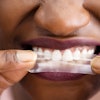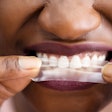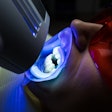Two cases involving nondentists performing teeth-whitening services without the proper credentials -- one in the U.K., the other in New Zealand -- have made headlines worldwide.
In the first, the U.K. General Dental Council (GDC) has successfully prosecuted a nonregistrant for performing tooth whitening, which the GDC regards as the practice of dentistry.
It was the first such case of its kind in the U.K., according to the GDC.
Paul William Hill of Warrington, director of PW Healthcare Consulting, pleaded guilty March 23 to four offenses, including practicing dentistry while not registered as a dentist or dental care professional between October 2, 2010, and March 11, 2011. Under the Dentists Act 1984, it is an offense for nonregistrants to practice dentistry.
Hill has been ordered to pay a total of 6,265 pounds in fines and costs and PW Healthcare Consulting, which traded nationally as Style Smile Clinics, has been ordered to pay a total of 6,765 pounds. The amounts include costs of 5,500 pounds for the GDC.
The GDC launched its investigation last year after receiving hundreds of complaints from members of the public and dental professionals about teeth-whitening treatments being provided by individuals who are not registered dental professionals.
The GDC, which regulates all dental professionals in the U.K., began criminal proceedings under the Dentists Act 1984 on the grounds that teeth whitening may only lawfully be provided by those who are registered dental professionals.
"This case has significant implications for the dental profession and for public protection," said Evlynne Gilvarry, chief executive and registrar of the GDC. "The GDC will now consider its position carefully with regards to the hundreds of other complaints about the illegal practice of dentistry that it has received. We are concerned about the risk to the public posed by such potentially hazardous treatment being provided by people without the training and qualifications necessary for registration as a dental professional."
Whitening after scaling was too soon
Meanwhile, in New Zealand, the Health and Disability Commissioner has issued a warning for consumers after a woman complained about painful side effects following teeth-whitening services supplied by an unregistered, nondentist practitioner.
Before the whitening, the woman had her teeth scaled and polished by a dental hygienist. The information given to the woman before the whitening warned of the possibility of whitening of the gums or gumline, and said that this side effect would be temporary. The woman was aware that the practitioner was not a dentist, according to a statement issued by the commissioner.
The woman stated that during the procedure she suffered pain, which she thought was normal. After the procedure, part of her gums turned white and she had severe mouth pain and burning gums that continued until the next day. The pain appeared to have been caused by the woman having gingival recession and exposed root surface dentine.
When advised of the pain, the teeth-whitening practitioner suggested that the woman return for a "professional clinical evaluation"; however, the woman had lost confidence in the teeth-whitening practitioner and did not wish to return, the commissioner said.
The teeth-whitening practitioner subsequently amended the information to warn consumers that carrying out teeth whitening too soon after scaling and polishing may result in discomfort and advised clients to wait 14 days after scaling and polishing before undergoing teeth whitening.
"There is no legal requirement for teeth whitening to be performed by a dentist," the commissioner stated. "The teeth whitener was not a dentist, but was trained and certified by the parent organization that supplied the system used."
Environmental Risk Management Assessment (ERMA) New Zealand is now proposing to amend the specified dental products group standards to provide that dental products containing or releasing more than 3.6% hydrogen peroxide can be obtained by a member of the public only from a dentist, according to the commissioner.
"This case highlights the risks of teeth whitening being carried out by persons who are not qualified to assess consumers' teeth or form conclusions whether their teeth are suitable for teeth whitening," the commissioner stated.



















